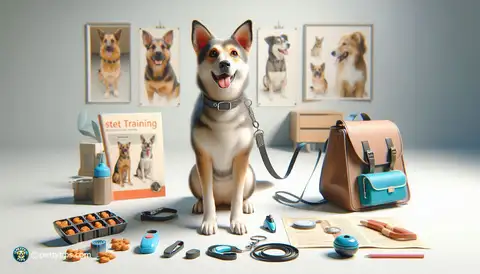
Mastering the Art of Teaching Your Dog to Stay
Erin Etienne - Sep 02, 2024 - 7 min read


When it comes to socializing your pet, there's no time like the present. Early socialization is key to helping your furry friend become a well-adjusted member of society. Puppies and kittens, in particular, are like sponges when it comes to learning about the world around them. Exposing them to a variety of people, animals, and environments during their critical developmental period can set them up for success later in life.
While it's important to start socialization early, it's equally important to go at your pet's pace. Forcing them into overwhelming situations can backfire and lead to fear or anxiety. Instead, introduce new experiences gradually, allowing your pet to become comfortable at their own speed. Remember, it's not a race, and every pet is unique in their socialization journey.
Make socialization a positive experience for your pet by using plenty of treats, praise, and rewards. When they encounter something new, reward them for their bravery and calm behavior. This will help them associate new experiences with good things, making them more likely to approach future situations with confidence.
Consistency is crucial when it comes to socialization. Make an effort to expose your pet to new people, animals, and environments on a regular basis. Consistent exposure will reinforce positive behaviors and help your pet feel more comfortable and confident in various situations. Whether it's a weekly trip to the dog park or a monthly visit to a friend's house, make socialization a part of your pet's routine.
When it comes to socializing your pet, it's important to start slow and gradually expose them to new experiences. Rushing the process can lead to fear or anxiety, so take your time and let your pet adjust at their own pace. Start with low-pressure situations, such as quiet walks in the park or short visits with friends and family members.
One of the biggest mistakes pet owners can make when socializing their furry friends is forcing interaction. While it's natural to want your pet to get along with everyone they meet, it's important to respect their boundaries and let them initiate contact on their own terms. Forcing interaction can be overwhelming for your pet and may lead to negative associations with socialization.
positive reinforcement is key to successful socialization. When your pet encounters something new, reward them with treats, praise, or playtime to reinforce positive behavior. This will help them associate new experiences with good things and encourage them to approach future situations with confidence.
It's important to expose your pet to new experiences, but it's equally important not to overwhelm them. Pay attention to your pet's body language and behavior, and be prepared to back off if they seem stressed or anxious. Remember, socialization should be a positive experience for your pet, so always prioritize their comfort and well-being.
Dogs are social animals by nature, but they still need proper socialization to develop good manners and prevent behavioral problems. Start socializing your puppy as early as possible and expose them to a variety of people, dogs, and environments. Gradually increase the difficulty of social situations as your puppy grows older, but always prioritize positive experiences.
While cats may not be as social as dogs, they still benefit from proper socialization. Start by handling your kitten gently from a young age and exposing them to different people, sounds, and environments. Provide plenty of positive reinforcement and take things slow, allowing your kitten to become comfortable at their own pace.
Birds are highly social creatures that thrive on interaction with their human caregivers. Spend plenty of time socializing with your bird, talking to them, and offering treats and toys for stimulation. Introduce them to new people and environments gradually, and always provide positive reinforcement for good behavior.
Small mammals like rabbits, guinea pigs, and ferrets can also benefit from socialization. Spend time handling and interacting with your pet on a daily basis, and provide plenty of opportunities for them to explore their environment. Introduce them to new people and animals slowly, and always supervise interactions to ensure everyone stays safe.
Fear and anxiety can be common challenges when it comes to socialization. If your pet is exhibiting signs of fear or anxiety, take a step back and slow down the socialization process. Gradually expose them to new experiences in a controlled environment, using plenty of positive reinforcement to help them feel more comfortable.
Aggression can also be a problem during socialization, especially in dogs. If your pet is displaying aggressive behavior towards people or other animals, seek the help of a professional trainer or behaviorist. With patience and consistency, you can help your pet overcome their aggressive tendencies and learn to socialize in a positive manner.
If your pet has had a traumatic experience in the past, such as an attack by another animal, it's important to take extra care during the socialization process. Go at your pet's pace and be patient as they work through their fear and anxiety. With time and gentle guidance, you can help your pet overcome their past experiences and become more confident in social situations.
Pets that have not been properly socialized from a young age may struggle with new experiences later in life. If you have adopted an older pet or neglected socialization in the past, don't despair. With patience and consistency, you can still help your pet become more comfortable in social situations. Start slow and gradually expose them to new experiences, using plenty of positive reinforcement along the way.